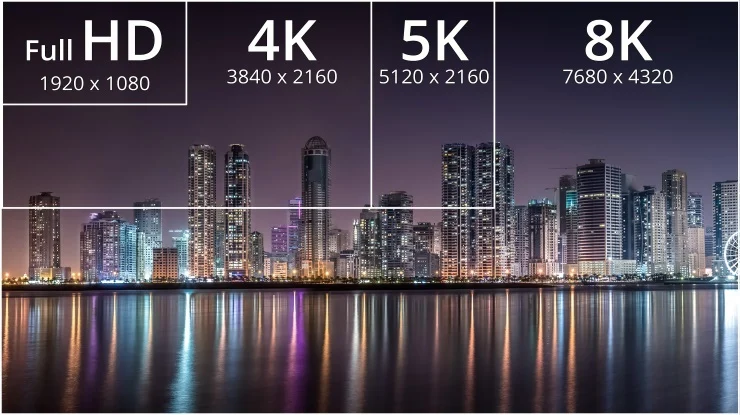The TV market is dominated via 4K and 8K shows, however is it sincerely worth paying extra to get the latter? Let’s smash down the visible variations between the 2 technologies to peer which one exceptional suits your viewing behavior.
Overall Findings
4K
- Older, greater supported tech.
- Resolution: 3840 x 2160.
- Available at numerous price levels.
8K
- Newer, with less guide presently.
- Resolution: 7680 x 4320.
- Generally extra expensive.
If you’re within the market for a brand new TV, you’ll maximum probably be looking at presentations that output as much as 4K or 8K decision. While most effective round half of U.S. Families very own a 4K-succesful TV, it’s in large part changed excessive-definition (HD) because the industry standard.
8K TVs have been round for approximately a decade now, but have did not capture on inside the identical manner as 4K. This slow adoption can be attributed to many motives, but price and a lack of 8K content are foremost contributing factors.
There’s no doubt that 8K is a higher technology than 4K however is that this by myself really worth upgrading for? We’ve damaged down the competing formats’ resolution, compatibility, to be had content, and value that will help you decide.
Resolution: 8K is Better, however 4K is the Standard
4K
- Standard 4K/UHD TV is 3840 x 2160 pixels. 4K cinema popular is 4096 x 2160 pixels.
- Four instances the range of pixels as 1080p (HD layout).
- Very accurate element and readability.
- Ideal for most home theater setups.
- Less detail and readability at larger display sizes.
8K
- 7680 x 4320 pixels.
- Four times as many pixels as 4K (and 16 times as many as 1080).
- Best element and readability.
- Ideal for large screens.
On a trustworthy technical level, 8K is a better decision than 4K, resulting in a far sharper photograph. Whereas 4K (3,840 x 2,one hundred sixty pixels) is 4 instances the decision of 1080p (1,920 x 1,080), 8K (7,680 via four,320) displays four instances as many pixels as 4K. However, whether you’ll absolutely be aware a difference is arguable.
4K TVs already provide a excessive enough decision which you’re not likely to note any pixelation or jaggedness. One of the main benefits of 8K is that it helps you to view larger TVs from a better distance with out a decline in picture best. However, this utility is restrained while you start factoring inside the excessive value of extremely-big TVs and the fact that your field of view has an upper restriction.
In different phrases, 8K is objectively a “higher” resolution than 4K, however you’re not likely to be aware the same jump in first-rate as you’ll have from 480p to 1080p, or 1080p to 4K.
Compatibility: 4K Has Much Wider Support
4K
- Works with maximum gadgets (streaming, broadcast, gaming, and more).
- Works with each HDMI 2.0 and HDMI 2.1 cables.
- Bitrate: 15 – 25 Mbps.
- Minimum internet velocity for streaming: 25 Mbps.
8K
- Limited like minded gadgets.
- Requires HDMI 2.1/superior cables.
- Bitrate: 50-100 Mbps.
- Minimum internet pace for streaming: 50 Mbps.
4K and 8K video both take in sizeable bandwidth, this means that you’ll need sources and cables able to handing over a whole lot of records. At minimum, you’ll want an HDMI 2.1 cable, which has a maximum bandwidth of 48Gbps (the old general, HDMI 2.0, can most effective do 18Gbps).
HDMI 2.0 supports 4K at 60hz, however in case your TV has a higher refresh price (120hz or more), you’ll need to use a 2.1 cable to keep away from a loss in video best. HDMI 2.1 supports uncompressed 4K at a hundred and twenty fps and 8K at 60 fps.
Whether you pick out 4K or 8K, it’s probably a terrific idea to begin changing your HDMI 2.0 cables with 2.1 to make sure you’ve got the satisfactory available great. However, simply don’t forget that to get an 8K photograph, each tool inside the chain needs to support 8K: your source (streaming box, game console, and many others.), cables, and TV. This is less of a difficulty with 4K due to the fact most assets are compatible with it.
Content: Way More Available in 4K
4K
- Widely available on streaming services and Blu-ray.
- PS5 and Xbox Series X help.
- Upscales HD content material.
8K
- Limited content material availability.
- No Blu-ray assist presently.
The largest gain 4K has over 8K right now could be real content. Simply put, there isn’t plenty you may in reality watch in 8K. No streaming offerings, broadcasters, or bodily media assist it. Your best options at this factor are 8K demo content on YouTube (some of that’s just upscaled 4K) and a devoted 8K TV channel in Japan (if you may get right of entry to it).
4K content material is restrained to some extent, however it’s a great deal more extensively available. For example, Netflix gives extra than 1,2 hundred titles in 4K, you could sport in 4K on the PlayStation 5 and Xbox Series X, and a massive choice of UHD Blu-rays is to be had.
Cost and Availability: 4K is Much Cheaper
4K
- Affordable prices.
- Many fashions to select from.
- Frequently discounted.
8K
- Expensive.
- Fewer fashions available.
- Limited reductions.
Both 4K and 8K TVs have seen widespread charge reductions in current years, however the former continues to be a good deal more less expensive.
High-cease 4K TVs like the 65-inch LG OLED C3 pass for round $1,six hundred, however you could still get a truly good model for well underneath $1,000. By comparison, Samsung’s QLED 8K models start round $3,500 and cross up speedy from there (although you could usually find them on sale for a first rate discount).
There’s also availability to take into account. Outside of Samsung and a few different brands, maximum TV manufacturers either don’t provide 8K units or have pulled back substantially because of low adoption charges. The 4K market is a lot extra competitive, making it less complicated to discover lower-priced, fantastic presentations.
Final Verdict: Stick With 4K For Now
From a natural technical level, 8K is advanced to 4K. But is it really worth buying an 8K TV? Probably now not.
Of path, the calculation goes to be special for you if money’s no object. In that case, there definitely isn’t a disadvantage to getting an 8K TV. Even if there’s not anything to look at proper now, an 8K TV can upscale 4K content for a sharper photograph, and destiny-proofing your own home theater setup is never a bad idea.
However, for maximum human beings, 4K continues to be the excellent manner to go. There’s lots of 4K content you could take advantage of proper away, costs are fairly low, and the decision itself continues to be awesome dazzling.


